I like this story, much to learn from it 🙂
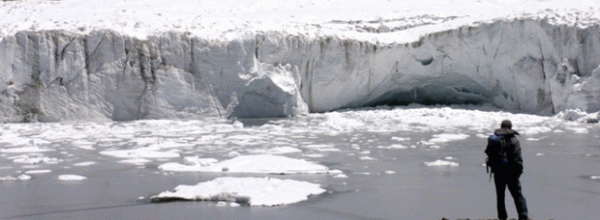


I like this story, much to learn from it 🙂
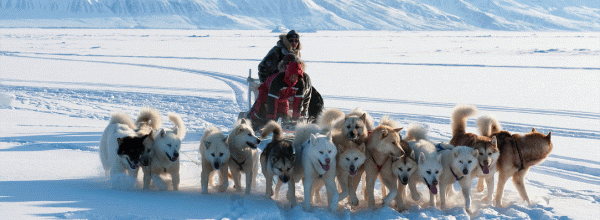
Very timely post, thanks 🙂

This status and outlook synthesis just arrived, file is about 16 mb and available in several languages
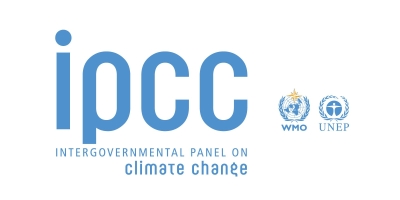
Image: IPCC Logo – Intergovernmental Panel on Climate Change
Below are some discretionarily selected parts – with no further comments – from the summary of 5th IPCC report.
Ref: IPCC, 2014: Climate Change 2014: Synthesis Report. Contribution of Working Groups I, II and III to the Fifth Assessment Report of the Intergovernmental Panel on Climate Change [Core Writing Team, R.K. Pachauri and L.A. Meyer (eds.)]. IPCC, Geneva, Switzerland, 151 pp.
http://www.ipcc.ch/report/ar5/syr/
http://www.ipcc.ch/pdf/assessment-report/ar5/syr/SYR_AR5_FINAL_full.pdf
SPM 2.1: Key drivers of future climate (p.8-10)
Anthropogenic GHG emissions are mainly driven by population size, economic activity, lifestyle, energy use, land use patterns, technology and climate policy. The Representative Concentration Pathways (RCPs), which are used for making projections based on these factors, describe four different 21st century pathways of GHG emissions and atmospheric concentrations, air pollutant emissions and land use. The RCPs include a stringent mitigation scenario (RCP2.6), two intermediate scenarios (RCP4.5 and RCP6.0) and one scenario with very high GHG emissions (RCP8.5)… RCP2.6 is representative of a scenario that aims to keep global warming likely below 2°C above pre-industrial temperatures.
Multiple lines of evidence indicate a strong, consistent, almost linear relationship between cumulative CO2 emissions and projected global temperature change to the year 2100 in both the RCPs and the wider set of mitigation scenarios analysed in WGIII.
SPM 2.2: Projected changes in the climate system (p.10-13)
The increase of global mean surface temperature by the end of the 21st century (2081?2100) relative to 1986?2005 is likely to be 0.3°C to 1.7°C under RCP2.6, … and 2.6°C to 4.8°C under RCP8.59. The Arctic region will continue to warm more rapidly than the global mean.
It is virtually certain that there will be more frequent hot and fewer cold temperature extremes over most land areas on daily and seasonal timescales…”
Changes in precipitation will not be uniform. … In many mid-latitude and subtropical dry regions, mean precipitation will likely decrease, while in many mid-latitude wet regions, mean precipitation will likely increase under the RCP8.5 scenario. Extreme precipitation events over most of the mid-latitude land masses and over wet tropical regions will very likely become more intense and more frequent.
The global ocean will continue to warm during the 21st century, with the strongest warming projected for the surface in tropical and Northern Hemisphere subtropical regions.
Earth System Models project a global increase in ocean acidification for all RCP scenarios by the end of the 21st century… (15 to 17% increase in acidity) for RCP2.6, to (100 to 109%) for RCP8.5
Year-round reductions in Arctic sea ice are projected for all RCP scenarios. A nearly ice-free11 Arctic Ocean in the summer sea-ice minimum in September before mid-century is likely for RCP8.5.
It is virtually certain that near-surface permafrost extent at high northern latitudes will be reduced … projected to decrease by 37% (RCP2.6) to 81% (RCP8.5)…
The global glacier volume, excluding glaciers on the periphery of Antarctica (and excluding the Greenland and Antarctic ice sheets), is projected to decrease by 15 to 55% for RCP2.6 and by 35 to 85% for RCP8.5
SPM 2.3: Future risks and impacts caused by a changing climate (p.13-15)
“… A large fraction of species faces increased extinction risk due to climate change during and beyond the 21st century, especially as climate change interacts with other stressors (high confidence). Most plant species cannot naturally shift their geographical ranges sufficiently fast to keep up with current and high projected rates of climate change in most landscapes;
most small mammals and freshwater molluscs will not be able to keep up at the rates projected under RCP4.5 and above in flat landscapes in this century (high confidence). Future risk is indicated to be high by the observation that natural global climate change at rates lower than current anthropogenic climate change caused significant ecosystem shifts and species extinctions during the past millions of years. Marine organisms will face progressively lower oxygen levels and high rates and magnitudes of ocean acidification (high confidence), with associated risks exacerbated by rising ocean temperature extremes (medium confidence). Coral reefs and polar ecosystems are highly vulnerable…”
… By 2100 for RCP8.5, the combination of high temperature and humidity in some areas for parts of the year is expected to compromise common human activities, including growing food and working outdoors (high confidence).
In urban areas climate change is projected to increase risks for people, assets, economies and ecosystems, including risks from heat stress, storms and extreme precipitation, inland and coastal flooding, landslides, air pollution, drought, water scarcity, sea level rise and storm surges (very high confidence). These risks are amplified for those lacking essential infrastructure and services or living in exposed areas.
SPM 2.4: Climate change beyond 2100, irreversibility and abrupt changes (p.16)
“…Warming will continue beyond 2100 under all RCP scenarios except RCP2.6. … A large fraction of anthropogenic climate change resulting from CO2 emissions is irreversible on a multi-century to millennial timescale, except in the case of a large net removal of CO2 from the atmosphere over a sustained period.
Stabilization of global average surface temperature does not imply stabilization for all aspects of the climate system. Shifting biomes, soil carbon, ice sheets, ocean temperatures and associated sea level rise all have their own intrinsic long timescales which will result in changes lasting hundreds to thousands of years after global surface temperature is stabilized.
There is high confidence that ocean acidification will increase for centuries if CO2 emissions continue, and will strongly affect marine ecosystems.
It is virtually certain that global mean sea level rise will continue for many centuries beyond 2100… The threshold for the loss of the Greenland ice sheet over a millennium or more, and an associated sea level rise of up to 7 m, is greater than about 1°C (low confidence) but less than about 4°C (medium confidence) of global warming with respect to pre-industrial temperatures.
Magnitudes and rates of climate change associated with medium- to high-emission scenarios pose an increased risk of abrupt and irreversible regional-scale change in the composition, structure and function of marine, terrestrial and freshwater ecosystems, including wetlands…”
SPM 3.1: Foundations of decision-making about climate change (p.17)
“… Countries? past and future contributions to the accumulation of GHGs in the atmosphere are different, and countries also face varying challenges and circumstances and have different capacities to address mitigation and adaptation. Mitigation and adaptation raise issues of equity, justice and fairness. Many of those most vulnerable to climate change have contributed and contribute little to GHG emissions. Delaying mitigation shifts burdens from the present to the future, and insufficient adaptation responses to emerging impacts are already eroding the basis for sustainable development…
Climate change has the characteristics of a collective action problem at the global scale, because most GHGs accumulate over time and mix globally, and emissions by any agent (e.g., individual, community, company, country) affect other agents. Effective mitigation will not be achieved if individual agents advance their own interests independently…”
The first story seems to suggest a London politician wants to lead the way for divestment from fossil fuels … especially ‘dirty coal’. Bravo! Or not?
http://www.theguardian.com/commentisfree/2015/mar/17/britain-coal-investment-fossil-fuel-assets-worthless-divestment
The second story however, written a year earlier, shows Britain’s reliance on coal is very low. The coal mines themselves virtually, if not actually, gone by now. Power stations took recent advantage of cheap, and dirty, coal exported by USA to Europe; USA switched to even dirtier fracking products. UKCoal said only 4% of power in UK was generated by their coal in 2013.
http://www.telegraph.co.uk/finance/newsbysector/energy/10740600/Britain-to-have-just-one-remaining-coal-pit-after-UK-Coal-announces-closures.html
So, effectively, Ed Davey is shouting loudly about climate change (good), but secretly Britain will be largely unaffected, whereas many other developing countries will once again bear the brunt of these policies. Unfairness and deceit are still the order of the day 🙁
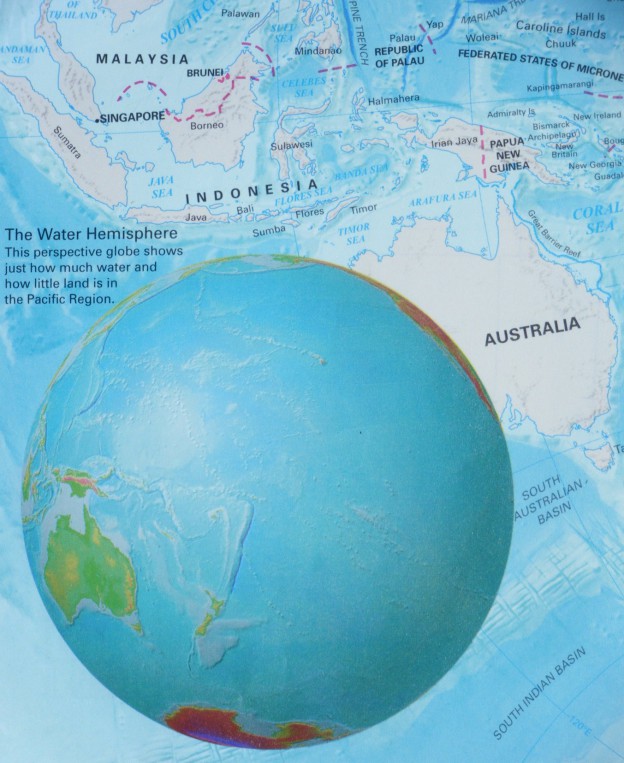
Image: Image from MacMillan New Zealand World Atlas, p. 48
People in the industrialised world often don’t understand why climate change might be of any concern. Too often they frame their viewpoint in terms of how it affects their wage packet, or maintaining their daily lifestyle; that is understandable. It’s the only reality they might know.
But people on the other side of our planet have a very different understanding of reality. This is something we would like to share with you. Climate change is real, our weather patterns have changed; sea levels are creeping up, sometimes substantially. The salt affects what will grow in our already-poor soil; and may well kill the food crops that are already producing fruit. Now you might not care: you just go to the supermarket and shop … we often have no shops. Even if there is a small store the food has to come from very far away, adding further to greenhouse gas emissions. It doesn’t work.
The consumer world’s activities may well cause us to lose our homelands and the burial grounds of our ancestors. Please wake up. Thanks. 🙂
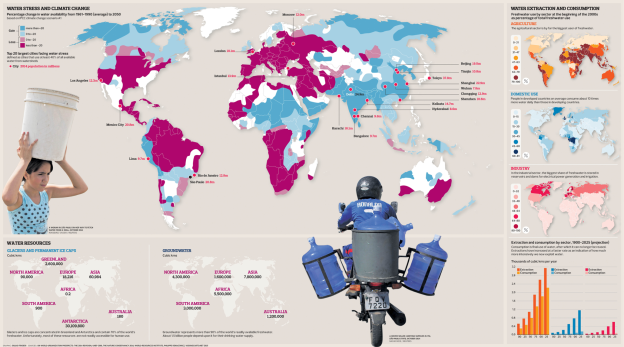
As many of us already know the most precious resource on Earth is drinking water ~ life soon collapses without it. Not only do we use it very unsustainably, but we have a passion for polluting much of the rest. Oh well 🙁
This arrived in my inbox this morn. Does anyone have any data on this topic? We know the albedo effect is true: as the ice melts the darkness of the ocean surface absorbs more radiated heat. We also know that methane is far more problematic as a greenhouse gas than CO2. Mike 🙂
From Ricken Patel – AVAAZ
“Dear Avaaz community,

|
This may be the most important email I’ve ever written to you.
Some time ago, a scientist went on his biannual tour of the Russian arctic ocean, checking for toxic plumes of methane gas bubbling up from the ocean. He’d previously seen hundreds of these plumes, about a meter wide each, emitting gas 50 times more damaging to our climate than carbon dioxide. This time, as he came across the first plume, he couldn’t believe it. It was a KILOMETER wide. A vast column of gas entering our atmosphere. He sailed on and found another a kilometer wide, and another, and another. Hundreds of them.
This could be what the experts warned us about. As the earth warms, it creates many “tipping points” that accelerate the warming out of control. Warming thaws the Arctic sea ice, destroying the giant white ‘mirror’ that reflects heat back into space, which massively heats up the ocean, and melts more ice, and so on. We spin out of control. In 2014 everything was off the charts — it was the hottest year in recorded history.
We CAN stop this, if we act very fast, and all together. And out of this extinction nightmare, we can pull one of the most inspiring futures for our children and grandchildren. A clean, green future in balance with the earth that gave birth to us.
We have 10 months left until the Paris Summit, the meeting that world leaders have decided will determine the fate of our efforts to fight climate change. It might seem like a long time — it’s not. We have 10 months to get our leaders to that meeting, give them a plan, and hold them accountable. It’s us vs. the oil companies, and fatalism.
We can win, we must, but we need to blast out of the gate in 2015 with pledges of just a few dollars/euros/pounds to support our work this year — we’ll only process the donations if we hit our goal (10,000 new supporters). For the world we dream of, let’s make it happen.
Fatalism on climate change is not just futile, it’s also incompetent. The hour is late, but it is still absolutely within our power to stop this catastrophe, simply by shifting our economies from oil and coal to other sources of power. And doing so will bring the world together like never before, in a deep commitment and cooperation to protect our planetary home. It’s a beautiful possibility, and the kind of future Avaaz was born to create. Facing this challenge will take heart, and hope, and also all the smarts we have. Here’s the plan:
We need tens of thousands of us to pledge small donations to blast out of the starting gate on this plan. The amount doesn’t matter as much as the choice — to hope, and to act:
At the last major climate summit in Copenhagen 2009, we played a pivotal role in German and Japanese ‘climate’ elections, in shifting Brazilian policy, and in helping win a major global deal on financing, with rich countries promising $100 billion per year to poor countries to help them address climate change. Back then, Avaaz was 3 million people. After Copenhagen, we reflected that we needed to be a lot bigger to meet the challenge posed by climate change. Now, we’re 40 million, and rising fast.
Climate change is the ultimate global collective action problem, requiring cooperation from every government in the world. And Avaaz is the ultimate collective action solution, with millions of us united in common vision across every nation. This is our time, to build a world for our children whose beauty matches our dreams. Let’s get started.
With hope and appreciation for this amazing community,
Ricken and the entire Avaaz team
MORE INFORMATION:
2014 was the hottest year on record (Bloomberg)
http://www.bloomberg.com/graphics/2014-hottest-year-on-record/
“Vast methane plumes escaping from the seafloor” discovered in Siberian Arctic Sea (Daily Kos)
http://www.dailykos.com/story/2014/07/28/1317252/–Vast-methane-plumes-escaping-from-the-seafloor-discovered-in-Siberian-Arctic-Sea#
Five Reasons We Need a New Global Agreement on Climate Change by 2015 (Switchboard NRDC)
http://switchboard.nrdc.org/blogs/jschmidt/five_reasons_we_need_a_new_glo.html
10 Signs the stars are aligning for a climate deal in Paris (The Guardian)
http://www.theguardian.com/environment/2015/jan/21/10-signs-stars-are-aligning-for-climate-deal-paris
The Arctic Ice ?Death Spiral? (Slate)
http://www.slate.com/blogs/bad_astronomy/2013/05/28/arctic_sea_ice_global_warming_is_melting_more_ice_every_year.html

Avaaz.org is a 40-million-person global campaign network that works to ensure that the views and values of the world’s people shape global decision-making. (“Avaaz” means “voice” or “song” in many languages.) Avaaz members live in every nation of the world; our team is spread across 18 countries on 6 continents and operates in 17 languages. Learn about some of Avaaz’s biggest campaigns here, or follow us on Facebook or Twitter.
You are getting this message because you signed “Monsanto vs. Mother Earth” on 2013-04-10 using the email address ********
To ensure that Avaaz messages reach your inbox, please add avaaz@avaaz.org to your address book. To contact Avaaz, please do not reply to this email. Instead, write to us at www.avaaz.org/en/contact or call us at +1-888-922-8229 (US).
This article also has a link to an online calculator. Several things jump out. Politicians are absolutely the worst people to do anything about climate change ~ they can only think short-term & are terrified of doing anything that upsets a voter!
When you look at the calulator, there are all manner of lifestyle choices … but most of them mean that the billions of folk living in poverty, are expected to remain in poverty. That really isn’t on. One solution of course is global equality: everyone is entitled to exactly the same amount of all resources, whether food, water, clean air, electricity etc.
The real message for these times is: how do your individual actions & choices affect other people? How many people starve because you’ve just had your 3rd long-distance holiday this year? How many innocents must suffer because a greedy nation decides to have a war somewhere else.? Please: think of others 🙂